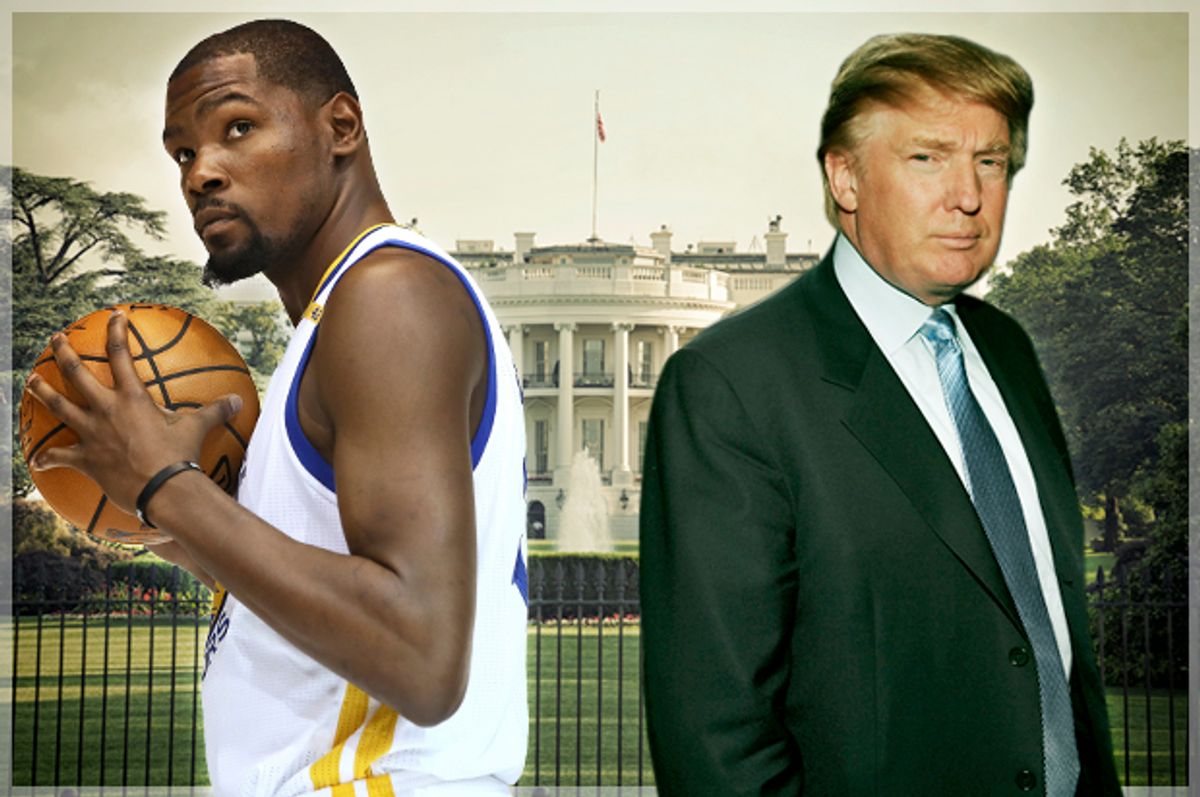It was with 55 seconds left in regulation that Kevin Durant knew. The Golden State Warriors were leading the Cleveland Cavaliers by 11 points in Game 5 of the NBA Finals; it was too great a hole for the Cavaliers, the defending NBA champions, to climb out of given the time remaining. Durant bent over, looked down and in the hardwood floor allowed himself to see the abstract shape of the milestone before him. “Is this really happening?” he recalled asking himself.
Durant might have been the only person on the planet experiencing disbelief, for two reasons. First, his presence practically guaranteed this outcome (a championship) before the 2016-2017 NBA season began. After Durant joined the Warriors, the team had two of the league’s best five players and four All-NBA-level players, each in their prime. And they fit together like Voltron; each is versatile and complements and augments the other players’ skill sets. “He fit into our system perfectly,” the Warriors coach Steve Kerr would tell reporters earlier on during the Finals, speaking of Durant. If this Golden State Warriors team had not been crowned champions, that would have been cause to ask, “Is this really happening?”
Second, the events of the past year have changed the parameters for disbelief. Beginning with last year’s NBA Finals, when the Cavaliers came back from a 3-to-1 game deficit to defeat a historically great Warriors team, unlikely outcomes have become regular occurrences. In sports, the Chicago Cubs have also rebounded from a 3-to-1 game deficit to dramatically win their first World Series in more a century. And at the Super Bowl, the New England Patriots were trailing the Atlanta Falcons 28 to 3 in the third quarter, a scenario that left them with a 0.4 percent chance of winning, when they mounted a successful comeback.
Even at the Oscars, America’s most prestigious awards ceremony, a drama on par with the films that were being recognized took place: The makers of “La La Land” were literally onstage holding the best picture statuettes and giving their “thank you” speeches before they were told that their film had not, in fact, won. And in politics, well, we all know what happened in November.
If needing any other proof of how the past year of unlikely outcomes has altered our dramatic appetites, look no further than the coverage of the Warriors’ run. After the first two games of the series, when the Warriors overwhelmed the Cavaliers like a megamall does a misanthrope, a writer for Rolling Stone declared the series “a near lock to be a disappointment.” And once it was over, a writer for Sports Illustrated tallied the winners and losers of the year’s NBA playoffs: Fans were one of the big losers. “Woof, those playoffs were boring,” he wrote. On Twitter, a theme that emerged along with the hashtag #NBAFinals, was that it was “disappointing.” Tuesday’s issue of New York papers like the Daily News and New York Post didn’t even allude to the series on their front pages.
Despite all the lamentations, the viewing numbers stayed strong, even hitting peaks unreached since Michael Jordan’s last year in the finals. It’s hard to account for why viewers kept tuning in; it could be because, unlike the media, fans were entranced by the Warriors’ dominance. Or it could be because the past year conditioned fans to expect a magnificent comeback.
That comeback, of course, didn’t take place this time. The Warriors were altogether as promised. Before the season FiveThirtyEight’s model predicted they would win 67 games. They won 68. And as ESPN’s Zach Lowe wrote, “Aside from an embarrassing season-opening loss to the Spurs, there was almost no drama — no angst over touches, no tense players-only meeting, no slow start. They gelled fast, and blitzed everyone.” To watch the Warriors in the NBA Finals was like watching Manchester United play the Los Angeles Galaxy; the Cavaliers and Warriors were playing the same sport, but the Warriors were playing a more advanced form that by contrast made the Cavaliers’ game seem crude.
The Warriors were not faultless during the finals. They got off to a couple slow starts. They suffered an ugly defeat in Game 4. And they were altogether sloppy in the first half of Monday night’s clinching victory. But when they were on — which was most of the series — they played an inspired form of basketball, thriving on balletic movement and marksman-like execution.
I was rooting for the Cavaliers but couldn’t help but marvel at the impending cloud the Warriors carried. When the Cavaliers got off to early leads, it always felt like merely a matter of time before the Warriors made it rain and then flood. In all but one of the games, the forecast was right. It rained as hard as was predicted. It’s just that, well, this time around no figurative frogs came down. There was no reason to ask, “Is this really happening?” The Warriors proved themselves to be a historically great basketball team, and yet the accomplishment felt underwhelming due to the lack of surreality and drama. Great was no match for bizarre, wild and unreal.



Shares